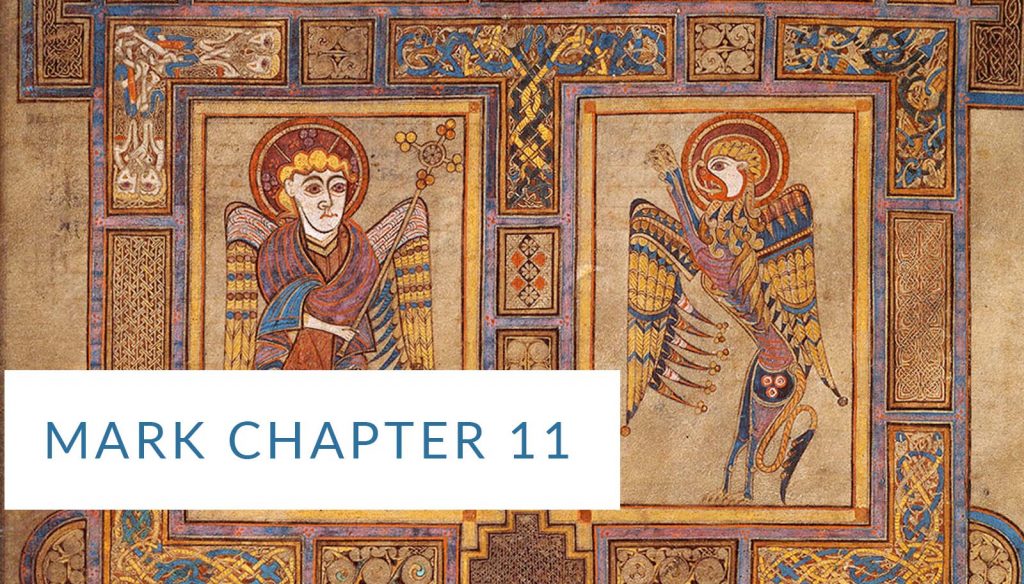This week’s readings are all from Mark chapter 11. Click here to see a full listing of each day's reading and the full chapter of Mark 11. Full readings of day’s smaller segments of the readings will be posted on this site during the week.
Today's Reading
Now as they approached Jerusalem, near Bethphage and Bethany, at the Mount of Olives, Jesus sent two of his disciples and said to them, “Go to the village ahead of you. As soon as you enter it, you will find a colt tied there that has never been ridden. Untie it and bring it here. If anyone says to you, ‘Why are you doing this?’ say, ‘The Lord needs it and will send it back here soon.’” So they went and found a colt tied at a door, outside in the street, and untied it. Some people standing there said to them, “What are you doing, untying that colt?” They replied as Jesus had told them, and the bystanders let them go. Then they brought the colt to Jesus, threw their cloaks on it, and he sat on it. Many spread their cloaks on the road and others spread branches they had cut in the fields. Both those who went ahead and those who followed kept shouting, “Hosanna! Blessed is the one who comes in the name of the Lord! Blessed is the coming kingdom of our father David! Hosanna in the highest!” (Mark 11.1–10 NET)
Gospel Parallels
"Riding on a Donkey"
Jesus is likely intentionally choosing to fulfill biblical Messianic expectations by riding a donkey; and as is typical, Mark weaves passages from the Hebrew scriptures into his narrative without giving them direct references. He, like Jesus, seems to expect his audience to understand. The fulfillment in this passage is Zechariah 9:9:
Rejoice greatly, daughter of Zion! Shout, daughter of Jerusalem! Look! Your king is coming to you: He is legitimate and victorious, humble and riding on a donkey — on a young donkey, the foal of a female donkey. (Zechariah 9.9 NET)
Elements of Psalm 118
Hosanna is Hebrew for "Rescue/Save, please!" or "Rescue/Save, now!" Though this exact form does not appear in the Hebrew Bible, there is a close form in verse 25 of Psalm 118 (a psalm traditionally read at Passover):
Rescue us, YHWH, please!
Give us success, YHWH, please!ʾAnnaʾ, YHWH, hoshiʿah na!
ʾAnnaʾ, YHWH, hatsliḥah na!
It seems that hoshiʿah na is what Mark is actually transliterating to Greek, since the first half of the next verse is quoted (again without Mark giving is explicit reference):
Blessed is the one who is coming in the Name of YHWH!
Psalm 118:26a
Notably, Mark leaves out the second half of verse 26:
We will pronounce blessings on you in the house of YHWH!
Psalm 118.26b
This provides a fitting missing element based upon what happens next in Mark's Gospel regarding Jesus and the Temple: Rather than being welcomed there, Jesus enters, looks around, and leaves (Mark 11.11). It is not the expected welcome of the Messiah or the expected actions on Jesus' part that has been set up by the dramatic entry and welcome outside the city. In Mark this moment is entirely anti-climactic. Notably, both Matthew and Luke have Jesus immediately cleanse the Temple on arrival and entry into Jerusalem (Matt 21.8–13; Luke 19.36–46).
Other elements of Psalm 118 are included in the narrative, however. The cutting of branches may reflect verse 27 as some would translate it:
The LORD is God, and he has given us light. Bind the festal procession with branches, up to the horns of the altar.
Psalm 118.27 NRSV
Verses 22-23 of Psalm 118 are often used in the New Testament to speak of the rejection of Jesus by the leaders but his primary role in God's work (see Matt 21.42;Luke 20.17; Acts 4.11; Eph 2.20; 1 Pet 2.6–7). Jesus will quote this verse in Mark 12:10 in closing a parable, directed against Jerusalem's leaders, regarding greedy and wicked stewards who reject and murder their master's son:
The stone that the builders discarded has become the cornerstone.
This is the LORD’s work. We consider it amazing!Psalm 118.22–23 NET
Have you not read this scripture: ‘The stone the builders rejected has become the cornerstone.
Mark 12.10 NET
